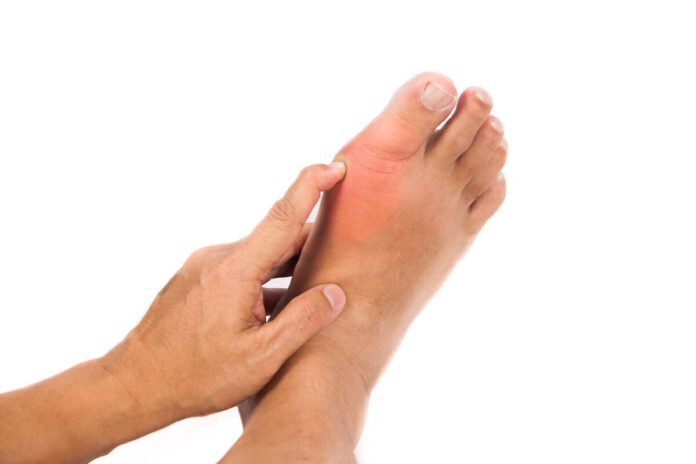What exactly is Gout?
Gout is an arthritis that develops when there is an excess of uric acid in the blood. Uric acid is a byproduct of digesting purines, which can be found in a wide variety of food and drink. Uric acid crystals cause inflammation and pain when the body is unable to flush out excess uric acid.
Reducing your consumption of high-purine meals like red meat, organ meats (liver and kidney), seafood (shrimp, lobster, and crab), and alcohol will help you avoid gout attacks. Fruits, vegetables, whole grains, nuts, and seeds are examples of foods low in purines that you should eat more of. Excess uric acid in the body can be eliminated by drinking lots of water.
Keeping to a healthy weight through exercise is another way to stave off gout flare-ups. The added stress on your joints from carrying more weight raises your risk of developing gout. Exercise is beneficial for managing weight since it increases joint flexibility and overall health. Your doctor may also prescribe medication to aid with your symptoms and/or reduce your uric acid levels.
Gout’s Root Causes
Too much uric acid in the blood causes the arthritic condition known as gout. Over time, crystals formed from this extra uric acid can collect in your joints, resulting in discomfort, inflammation, and swelling. It’s not always possible to avoid getting gout, but there are things you may do to lessen your chances of having an attack.
Consuming large amounts of purine-rich foods and drinks, like red meat, seafood, and alcohol, can lead to gout attacks. These foods raise your blood uric acid levels, which can trigger gout flare-ups. If someone in your family has had gout in the past, your risk of developing the condition is increased.
Gout risk factors include being overweight, having high blood pressure, and having high cholesterol. People with kidney illness or who take diuretics or aspirin may also be at increased risk for gout attacks. Maintaining a healthy weight through exercise and a balanced diet, avoiding excessive alcohol use, and staying hydrated with water rather than sugary drinks or alcohol might help reduce the frequency and severity of flare-ups.

Alternative Treatments
The use of medication is the first line of defense against gout attacks. During an acute attack, your doctor may prescribe painkillers and inflammation suppressants like nonsteroidal anti-inflammatory medicines (NSAIDs), colchicine, or corticosteroids. Therapy aimed at lowering urate levels in the body is sometimes administered to reduce the risk of future attacks.
Gout flares can be avoided with the help of a change in lifestyle. Keeping a healthy weight through exercise and nutritious food might lessen the chances of acquiring gout. You can reduce your chance of gout attacks by cutting back on alcohol and avoiding purine-rich meals like red meat, seafood, and organic meats.
Some persons with gout have found relief with alternative therapies like acupuncture or herbal remedies. The best way to know if an alternative treatment will be safe and beneficial for you is to discuss it with your doctor first.
Alterations to One’s Diet
Dietary changes are one of the most effective methods to prevent gout attacks. Foods high in purines should be avoided by those who suffer from gout since they contribute to the accumulation of uric acid in the body. Many foods, including beer, beer shrimp, and organ meats, contain purines because they are present in nature. You can lower your chance of a gout attack by limiting your consumption of certain foods or avoiding them completely.
Keeping a healthy weight is essential in warding off gout flare-ups. Being overweight or obese raises your risk of developing gout and makes it harder to control the disease once it sets in. Maintaining a healthy weight and getting enough of the vitamins and nutrients you need from a diet rich in fruits and vegetables is a win-win.
Finally, preventing gout attacks by being hydrated is crucial. Uric acid crystal formation can be prevented by drinking plenty of water, which helps drain excess uric acid out of the body. Try to drink 8-10 glasses daily, and if you’re looking for more hydration, consider adding herbal tea or fresh fruit juices.
Lifestyle Shifts
Modifying one’s way of life can have a dramatic effect on reducing the frequency and severity of gout attacks. First, it’s important to keep a healthy weight through a combination of physical activity and good food. This lowers stress on the joints and aids in uric acid management, both of which help prevent gout flare-ups.
Second, because dehydration can bring on a gout attack, it’s crucial to drink plenty of water throughout the day. You can avoid the formation of uric acid crystals in your joints by drinking enough water throughout the day.
Finally, reducing your alcohol intake is a good approach to avoid a gout attack. Alcohol consumption both increases uric acid production and impairs the body’s ability to eliminate the byproducts of this acid, leading to joint inflammation and pain. Reduced or eliminated alcohol consumption may reduce the frequency of gout attacks.
Potential Additives
If you want to keep your gout attacks at bay, supplementation may assist. Cherry extract is one supplement worth considering. The anti-inflammatory compounds in cherry extract have been demonstrated to reduce the severity and frequency of gout attacks. It also has the potential to reduce blood levels of uric acid.
Vitamin C is another supplement worth thinking about. Antioxidant vitamin C has been demonstrated to help reduce blood levels of uric acid, which in turn reduces the likelihood of gout attacks. It’s recommended to see your doctor about the right vitamin C dosage for you, but keep in mind that taking more than 2,000 mg per day may raise the risk of gout flare-ups in some people.
Supplementing with the omega-3 fatty acids contained in fish oil may also be useful in reducing the frequency of gout attacks. The inflammation caused by gout attacks can be alleviated by taking omega-3 fatty acids, which also help fight inflammation. Some supplements may conflict with other prescriptions or health concerns you have, so it’s vital to talk to your doctor before beginning a new regimen, just as you would with any medication or supplement.
Gout Management
In conclusion, gout management needs commitment and a willingness to alter one’s way of life. Flare-ups of gout can be avoided by watching what you eat and staying at a healthy weight. Cutting back on booze, staying away from purine-rich foods like red meat and seafood, and upping your water intake can all help.
Managing gout also requires maintaining a regular workout routine. Regular exercise is beneficial for the health of your joints and overall inflammation levels in the body. You might also get some relief from your symptoms during flare-ups by taking the medication your doctor has prescribed.
Keep in mind that everyone’s gout experience is unique, so you and your doctor should work together to find the best treatment for you. Gout can be managed effectively, allowing for a comfortable lifestyle with just mild discomfort following attacks.

